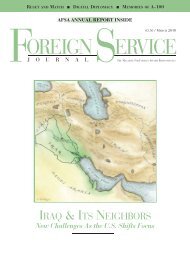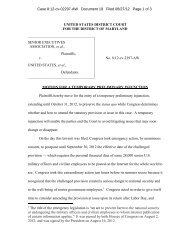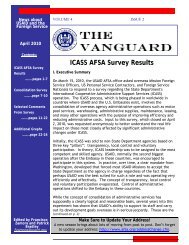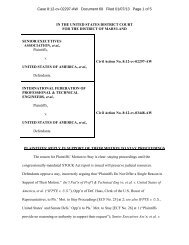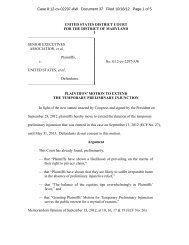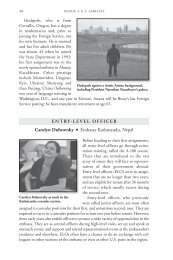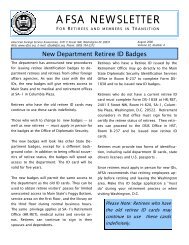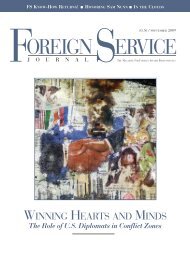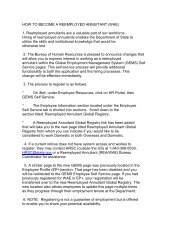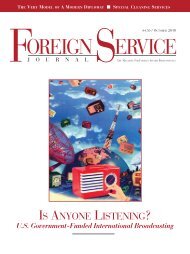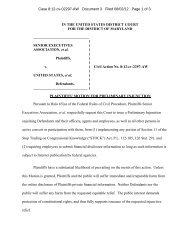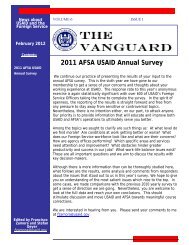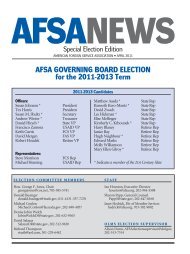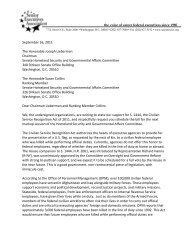F OCUS - American Foreign Service Association
F OCUS - American Foreign Service Association
F OCUS - American Foreign Service Association
Create successful ePaper yourself
Turn your PDF publications into a flip-book with our unique Google optimized e-Paper software.
• Counseling and additional support<br />
resources should be made available for<br />
spouses and families in distress to manage<br />
and regain control of their lives.<br />
• More information and resources<br />
about re-entry should be made available,<br />
and spouses need to know how to<br />
access it. One spouse, a former FLO<br />
employee, stated: “Overseas posts<br />
should do a better job of publicizing<br />
the information available and emphasizing<br />
the importance of preparing for<br />
re-entry.”<br />
Conclusions<br />
My study showed that re-entry<br />
problems were low to moderate for<br />
this sample of accompanying spouses<br />
overall — but their frequency was actually<br />
much higher when just younger<br />
spouses were considered. Further, as<br />
spouses of active-duty FS employees<br />
would almost certainly be younger, on<br />
average, than this sample of AAFSW<br />
members, it is likely that more reentry<br />
distress exists than is indicated<br />
by this study. To confirm this, I recommend<br />
a similar study be conducted<br />
among active-duty accompanying<br />
spouses during their first six months<br />
after return.<br />
The results reported here identify<br />
the main factors associated with reentry<br />
distress. Young spouses married<br />
for less than 10 years, and particularly<br />
those with young children and fewer<br />
children, have a higher rate of symptoms<br />
after return. Spouses who participate<br />
less in activities overseas,<br />
especially events and relationships with<br />
other U.S. embassy personnel and<br />
families, also have greater difficulty<br />
with re-entry. Spouses who have been<br />
in re-entry for a shorter period of time,<br />
as well as those who did not expect to<br />
have difficulties, also show a greater<br />
likelihood of having problems.<br />
Most notable among the unanticipated<br />
findings was the refutation of the<br />
traditional belief that foreign-born<br />
spouses have greater difficulty during<br />
re-entry than U.S.-born spouses. Another<br />
unexpected result was the link<br />
between involvement in the <strong>American</strong><br />
embassy community overseas and a reduction<br />
in re-entry distress.<br />
The State Department, through<br />
the Family Liaison Office and Community<br />
Liaison Offices, can utilize<br />
these findings to help identify <strong>Foreign</strong><br />
<strong>Service</strong> spouses who may be more susceptible<br />
to re-entry problems. The<br />
study indicated that more intervention<br />
prior to re-entry, while spouses are still<br />
overseas, would be beneficial.<br />
FLO has done an outstanding job<br />
supporting spouses and families, especially<br />
with the new employment and<br />
training initiatives overseas and in the<br />
U.S. But as this report shows, re-entry<br />
remains an issue in need of more attention.<br />
■<br />
A P R I L 2 0 0 9 / F O R E I G N S E R V I C E J O U R N A L 37



